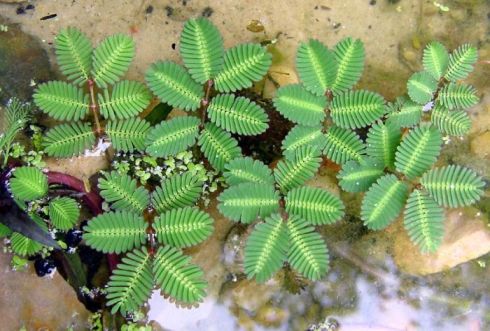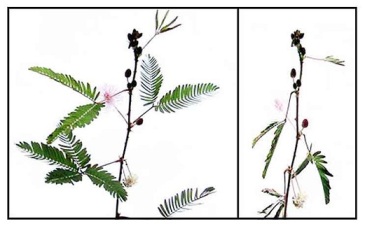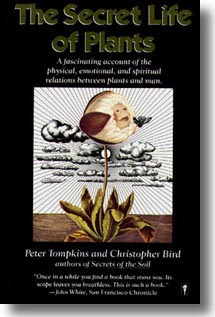
I first discovered a mimosa pudica, commonly called “the sensitive plant,” while traveling through Australia. Although it is declared an invasive species in Australia, the sensitive plant garners a great deal of popularity nonetheless. The appeal of a fast-moving plant no longer elicited such strong curiosity in most of my older Australian friends, but for children and foreigners to the region it is like a circus sideshow attraction: “Come one, come all, and watch a plant move away from your finger’s touch.”
Whether you call it the sensitive plant, sleeping plant, bashful plant, or touch-me-not, the mimosa pudica is certainly one of the strangest plant species that exist due to its anomalous behavior as a member of the plant kingdom. It is a fast-moving plant that folds its leaves in response to various stimuli, including physical.
As if a fast-moving plant weren’t enough, a recent study has increased public and scientific inquiry into the life of the sensitive plant even more. It appears that not only can the sensitive plant move, it also possesses the ability to remember.
Related Article: Did You Know That Certain Plants Do Division?
Scientists from Australia and Italy designed a behavior experiment for the sensitive plant with the same framework normally used in an animal behavior study. The results are incredible and have the potential to revolutionize the way we think of plants and imagine consciousness. For the first time ever scientists were able to show that despite the absence of a central nervous system a plant can still learn and remember just as well as would be expected of many animals.

The scientists trained sensitive plants’ short and long term memories in both high and low-light by repeatedly dropping water on their leaves. Although the physical stimulus of water dropping predictably caused the sensitive plants to retract their leaves, what wasn’t predictable is that they would eventually learn a different response. In a matter of seconds the plants opened their leaves back up since the stimulus had no harmful consequences. This in and of itself is amazing, but the findings get better.
Related Article: Plants Can Cry For Help
Just like in animals, the sensitive plant exhibited the learned behavior faster in less favorable environments. Most amazingly, the learned behavior persisted over several weeks, despite the return of optimal environmental conditions.
The researchers summarize their study, stating that,
Applying the theory and the analytical methods usually employed in animal learning research, we show that leaf-folding habituation is more pronounced and persistent for plants growing in energetically costly environments. Astonishingly, Mimosa [sensitive plant] can display the learned response even when left undisturbed in a more favourable environment for a month. This relatively long-lasting learned behavioural change as a result of previous experience matches the persistence of habituation effects observed in many animals.

Although plants don’t have a nervous system various types of learned responses have been observed in a copious number of plant species. While many hypothesis have been formed regarding how a plant can learn and remember without an immune system, there is no widely accepted conclusion.
The idea of plant sentience is nothing new. It has been explored as a philosophy for countless years, and has been observed experimentally for several decades. The idea is explored extensively in the book The Secret Life of Plants, by Peter Tompkins and Christopher Bird. The book is largely a compilation and analyzation of a large number of experiments dealing with plant sentience performed in the last century It is one of the most intriguing books I have ever read, and has dramatically altered the way I view plants and consciousness as a whole.
Related Article: Life, It’s All Over the Place
This study on the sensitive plant also has the wonderful effect of making purely moral vegans’ heads spin. Alan Watts once asked a Buddhist friend of his, “You refuse to eat meat, but don’t you realize plants have feelings too?” His friend’s response was, “yes, but they don’t scream so loudly.” Although I eat a mostly vegan diet, I think rationalizing a lifestyle choice by favoring one form of life over another is not moral, it’s ignorant. Thanks science.
Edit: With regards to my comments on purely moral vegans, I do not advocate or support the needless suffering and slaughter of animals or plants. I want mass factory farming to end just as much as anyone else, but a strictly moral stance will never reach that goal. Morality is relative and filtered through a subjective mind. There are enough logical reasons we can use to rid the world of sordid animal practices (zoos, factory farms, etc.) without slipping into the realm of morals and ethics. Using morality as a leg to stand on will only weaken the argument and serve as a step backward in our attempts to end pain and suffering for all species around the world.
Sources:
http://link.springer.com/article/10.1007%2Fs00442-013-2873-7
http://www.sci-news.com/biology/science-mimosa-plants-memory-01695.html
http://en.wikipedia.org/wiki/The_Secret_Life_of_Plants



